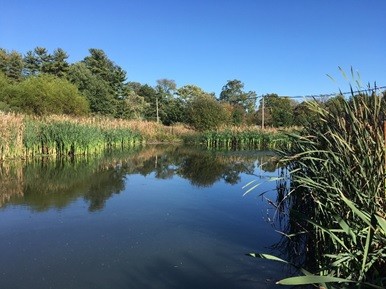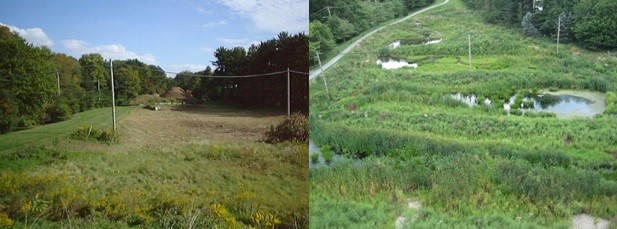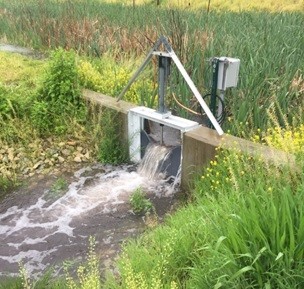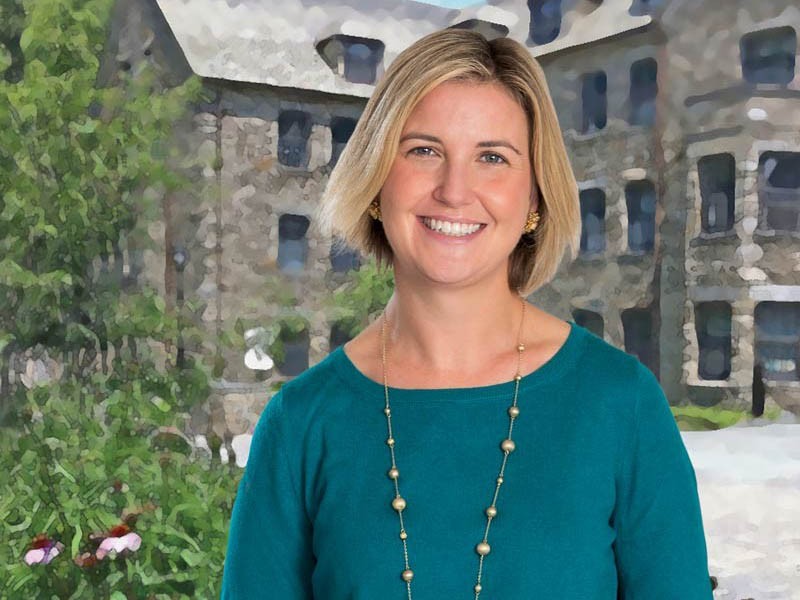Constructed Stormwater Wetland (CWS)

Constructed Stormwater Wetland
The Constructed Stormwater Wetland (CSW) treats over 42 acres of stormwater runoff on Villanova University’s main and west campus, and is one of the oldest stormwater control measures within the VCRWS. Supported by the EPA section 319 Nonpoint Source National Monitoring Program, the CSW was installed in 1999 and reconstructed in 2011 as a retrofit for a large detention basin located just south of County Line Road and what is now the Villanova Law School.
Detention basins provide little to no water quality improvement for urban stormwater runoff, and are often unable to slow down the flow of water created by impervious surfaces such as asphalt during large storms. Installing a wetland where detention basins currently exist is a very practical, small-footprint method for creating a more environmentally stable transition from urban runoff to local streams.
The Constructed Stormwater Wetland (CSW) treats over 42 acres of stormwater runoff on Villanova University’s main and west campus, and is one of the oldest stormwater control measures within the VCRWS. Supported by the EPA section 319 Nonpoint Source National Monitoring Program, the CSW was installed in 1999 and reconstructed in 2011 as a retrofit for a large detention basin located just south of County Line Road and what is now the Villanova Law School.
Detention basins provide little to no water quality improvement for urban stormwater runoff, and are often unable to slow down the flow of water created by impervious surfaces such as asphalt during large storms. Installing a wetland where detention basins currently exist is a very practical, small-footprint method for creating a more environmentally stable transition from urban runoff to local streams.

Original detention basin (1999) vs. Constructed Stormwater Wetland (2012)
The CSW was constructed with a series of sedimentation basins and meandering swales that slow down the flow of water and allow for contaminant removal by the dense wetland vegetation. Over its long tenure next to the Villanova Law School, the CSW has become a home for many native plant and animal species. Its vibrant bioactivity, in combination with attentive real-time flow control techniques, creates a system that is very resilient to the flashy peak flows and sudden changes in water quality produced by urban environments.

Adjustable sluice gate at the CSW
Constructed wetlands are different from other engineered systems in that they are alive, and have the ability to adapt to their living conditions. Knowing how urban wetlands change over time is an integral part of enhancing their performance. In order to better understand how to improve the efficiency of constructed stormwater wetlands, VCRWS has equipped the CSW with a wide range of monitoring equipment, including flow meters, depth sensors, and automatic samplers. Adjustable sluice gates have also been installed to help control the flow of water.
Ultimately, the Villanova CSW is a very effective study on how outdated, large-scale stormwater control measures in urban environments can be retrofitted for more environmentally sustainable techniques. Advanced flow attenuation and ecological treatment methods will continue to be explored at the CSW as part of the EPA Section 319 Nonpoint Source National Monitoring Program.
VCRWS NEWS
Chenfeng Xiong, PhD, Virginia Smith, PhD, and Peleg Kremer, PhD, with support from Bridget Wadzuk, PhD, have been awarded $750,000 of a $2 million research grant by the National Science Foundation (NSF) for a project designed to reduce the vulnerability of underserved communities to the social and environmental impacts of urban flooding events.
Dr. Bridget Wadzuk Receives 2024 Outstanding Faculty Research Award
The professor of Civil Engineering and director of Sustainable Engineering was recognized for her work in water resources engineering and green stormwater infrastructure, most notably her research on the evapotranspiration process from green roofs and bioretention.
Villanova researchers say rain gardens can be an effective tool for managing stormwater
The school's rain gardens have proven effective at helping prevent raw sewage from overflowing into waterways.
Courtesy of whyy.org



